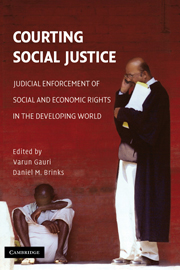Book contents
- Frontmatter
- Contents
- Foreword
- Preface
- Contributors
- 1 Introduction: The Elements of Legalization and the Triangular Shape of Social and Economic Rights
- 2 Litigating for Social Justice in Post-Apartheid South Africa: A Focus on Health and Education
- 3 Accountability for Social and Economic Rights in Brazil
- 4 Courts and Socioeconomic Rights in India
- 5 The Impact of Economic and Social Rights in Nigeria: An Assessment of the Legal Framework for Implementing Education and Health as Human Rights
- 6 The Implementation of the Rights to Health Care and Education in Indonesia
- 7 Transforming Legal Theory in the Light of Practice: The Judicial Application of Social and Economic Rights to Private Orderings
- 8 A New Policy Landscape: Legalizing Social and Economic Rights in the Developing World
- Index
- References
6 - The Implementation of the Rights to Health Care and Education in Indonesia
Published online by Cambridge University Press: 27 July 2009
- Frontmatter
- Contents
- Foreword
- Preface
- Contributors
- 1 Introduction: The Elements of Legalization and the Triangular Shape of Social and Economic Rights
- 2 Litigating for Social Justice in Post-Apartheid South Africa: A Focus on Health and Education
- 3 Accountability for Social and Economic Rights in Brazil
- 4 Courts and Socioeconomic Rights in India
- 5 The Impact of Economic and Social Rights in Nigeria: An Assessment of the Legal Framework for Implementing Education and Health as Human Rights
- 6 The Implementation of the Rights to Health Care and Education in Indonesia
- 7 Transforming Legal Theory in the Light of Practice: The Judicial Application of Social and Economic Rights to Private Orderings
- 8 A New Policy Landscape: Legalizing Social and Economic Rights in the Developing World
- Index
- References
Summary
SOCIAL RIGHTS AND CORRUPTION
There is a well-known saying in Indonesia: “When your rooster is stolen, do not go to the law enforcers, because you will then lose your goat.” Although it is unclear precisely when this phrase became popular, corruption in the Indonesian judiciary can be traced back to the 1945 to 1966 period – the years of the Soekarno presidency and the first presidency of the newly independent Indonesia.
In the years following Indonesian independence, judges were increasingly seen as “instruments of the revolution.” In line with this conception of the role of the judiciary, the president was formally granted far-reaching powers and influence over the judicial system. According to scholars of the Indonesian judiciary, this cooptation of the judiciary by the Soekarno administration began what would become a tradition of corruption within the Indonesian judiciary. Despite hailing itself as the “New Order” administration, the Soeharto government that directly followed the Soekarno administration did nothing to alleviate the lack of independence of the Indonesian court. During both the Soekarno and Soeharto administrations, lower court judges were frequently put under the jurisdiction of the executive. Lacking the legitimacy of a truly independent judiciary, a corrupt, bureaucratic culture emerged within the Indonesian judicial system. This culture of corruption has been studied in depth, and the lack of a functioning bar association until 2005, the absence of a promotion and placement system for judges, and the lack of a true judicial oversight system are frequently cited as being the most significant contributing factors.
- Type
- Chapter
- Information
- Courting Social JusticeJudicial Enforcement of Social and Economic Rights in the Developing World, pp. 224 - 267Publisher: Cambridge University PressPrint publication year: 2008
References
- 12
- Cited by



